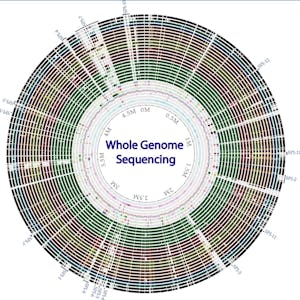This comprehensive course delves into the applications of Whole Genome Sequencing (WGS) for bacterial genomes, crucial in the medical sector. Through a series of modules, participants will gain an in-depth understanding of WGS technology and its applications, including species identification, antimicrobial resistance surveillance, and plasmid characterization.
This course, offered by Technical University of Denmark (DTU), provides a valuable opportunity to acquire practical knowledge in using online tools for WGS analysis and exercises for real-case scenarios. Upon completion, participants will be equipped to apply WGS technology and bioinformatic tools effectively for the surveillance and characterization of bacterial genomes.
Certificate Available ✔
Get Started / More Info
This course comprises modules covering principles of bacterial typing, NGS technology, tools for species identification and resistance gene detection, Salmonella and E. coli typing, and phylogenetic analysis. Participants will gain practical skills in using online tools for WGS analysis.
Module 1: Participants will be introduced to the general principles of bacterial typing and the applications of WGS for surveillance of antimicrobial resistance. They will also gain insights into applying WGS technology in real-case scenarios.
Module 2: This module provides an overview of Next-Generation Sequencing (NGS) and guides participants through the process of de novo assembly from raw reads to contigs using assembler tools.
Module 3: Participants will learn about the KmerFinder tool for species identification, the MLST tool for typing, and the Resfinder tool for resistance gene detection, along with their applications.
Module 4: This module covers tools for Salmonella and E. coli typing, plasmid replicon identification, and the detection of Mobile Genetic Elements in assembled sequences.
Module 5: Participants will explore the bacterial analysis pipeline, use the CSI Phylogeny tool for phylogenetic analysis, and learn to detect genetic markers using the MyDbFinder tool. The module ends with a comprehensive tutorial and final quiz.
This course on Drug Development offers insights from industry experts and faculty at the University of California San Diego. Gain knowledge about clinical trial...
Learn about cutting-edge experimental methods in systems biology, including RNA sequencing, mass spectrometry-based proteomics, flow/mass cytometry, and live-cell...
Molecular Tumor Board 2021-22 offers a comprehensive exploration of molecular profiles in solid tumors, enhancing clinical decision-making. This course is designed...
This course on Systematic Review and Meta-Analysis provides a comprehensive understanding of the systematic review process and its distinct stages, enabling participants...